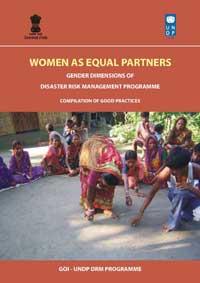Women as Equal Partners: Gender Dimensions of Disaster Risk Management Programme

Women as Equal Partners: Gender Dimensions of Disaster Risk Management Programme
January 21, 2012
The programme aims to contribute to the social and economic development goals of the national and state governments, enabling them to minimize losses to development gains and to reduce their vulnerability to natural disasters. Urban Earthquake Vulnerability Reduction Project (UEVRP), a sub-component of the drm programme, essentially aims at strengthening capacities of communities, urban local bodies and administration in mitigation, preparedness and response in 38 cities in india.
The primary objective of GoI-UNDP Disaster Risk Management (DRM) programme, implemented across 176 multi hazard prone districts in 17 states, is sustainable reduction in disaster risk. One of the critical indicators of disaster risk reduction is gender equity in disaster preparedness. “Women as Equal Partners” documents significant gender mainstreaming initiatives taken up under the programme. These good practices attempt to capture ongoing gender equity initiatives and activities involving different stakeholders. The rationale of bringing out a special publication is to highlight gender dimensions of the programme and to record those initiatives that promote women’s participation in areas where women are traditionally not well represented.
For better appreciation of gender equity in disaster risk reduction, UNDP with support from Women Power Connect – a national level organization of women’s groups and individuals facilitated the compilation of “Women as Equal Partners”. The document is a collective of various experiences derived from the field as experienced by different departments of government, civil society organizations, members of disaster management committees and teams, Disaster Management functionaries, women volunteers, Health (ASHA) workers, Anganwadi workers, Nehru Yuva Kendra Sangthan volunteers, Panchayati Raj Representatives and community leaders. Their experiences in ensuring women’s participation illustrate varied strategies adopted to address differential needs and vulnerabilities of men and women. The document will be effective in mainstreaming gender in to disaster risk management as a knowledge product and an advocacy tool.

 Locations
Locations




